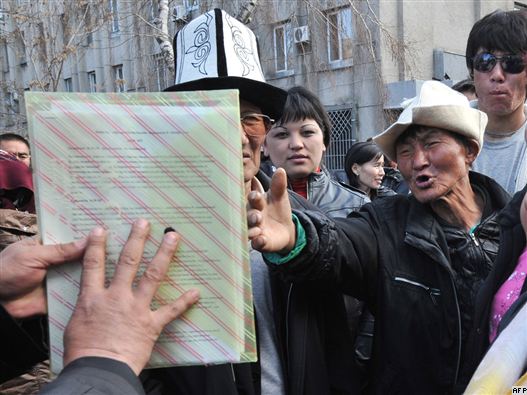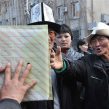
Who Is Instilling Fear in Kyrgyzstan?
Publication: Eurasia Daily Monitor Volume: 8 Issue: 64
By:

As the first anniversary of the April 7 “revolution” approaches, Bishkek is plagued by numerous small riots organized to challenge the parliament and government’s decisions. The riots may also be instigated by competing political forces ahead of the presidential elections later this year. The elections will determine the leading party among the five parties currently represented in parliament.
On March 30, a group of 300-500 traders from the capital’s “Osh” bazaar gathered in front of the parliament building demanding to meet Members of Parliament (MPs). The rioters insisted that Bishkek’s Mayor, Isa Omurkulov, must resign because he is allegedly facilitating raids on the bazaar. They refused to participate in a discussion with the MPs who came to talk to the crowd and threatened the ruling parties with carrying out another “revolution” to achieve their goals (www.akipress.kg, March 30).
The Bishkek Mayor’s office said that the rioters were forced to come out on the streets to stir up chaos (www.24.kg, March 30). However, neither the Mayor’s office, nor any MPs were prepared to explain who was behind organizing the riots. Jyldyz Joldosheva, an MP from the Ar-Namys party, who spoke with the rioters, was struck by a stone and suffered a head injury. The riot, according to MPs, was probably organized by unknown interlocutors for political purposes.
Political forces fomenting an atmosphere of uncertainty is also noticeable in southern Kyrgyzstan, according to local human rights activists. Valentina Gritsenko, the leader of the Jalalabad-based human rights organization “Spravedlivost,” said although the situation in southern Kyrgyzstan is somewhat calmer today compared with last year, some political forces continue to foster tensions between ethnic majority and minority groups. “Attempts to stir up chaos based on ethnic nationalist feelings never fails,” Gritsenko said at an Open Society Institute meeting in Washington on March 28.
Rocking the boat in Kyrgyzstan is part of the informal presidential campaign, Kyrgyz NGO leaders believe. Trying to create a sense of unruliness, presidential hopefuls want to make a case for strong centralized power. Particularly parties that were not part of the provisional government last year – Ata-Jurt and Ar-Namys – might be interested in seeing a strong presidential power in place. These parties did not participate in writing the new constitution but were able to win parliamentary seats by promising to protect their constituency.
Efforts to destabilize the country could prove to be effective for parties interested in using similar methods in the upcoming presidential elections. Competing political parties were able to abuse the trust of voters in southern Kyrgyzstan by promising the rule of law and justice, one prominent human rights activist told Jamestown. Particularly, the hopes of ethnic Uzbeks were abused, the activist alleged. Indeed, according to the International Republican Institute, last year 60 percent of Kyrgyz said the country is moving in the wrong direction. This is a two-fold increase since 2009, during the reign of former president Kurmanbek Bakiyev. The survey also shows that more Kyrgyz felt uncertain about their future in 2010 compared to previous years. While these results do not necessarily mean the society is longing for the return of authoritarian leadership, there is a strong demand for the rule of law and stability in the country (https://www.iri.org/sites/default/files/2011%20January%2024%20Survey%20of%20Kyrgyzstan%20Public%20Opinion,%20May%2011-25,%202010.pdf).
As the political competition intensifies in Kyrgyzstan, the possibility grows that the presidential election, scheduled for the end of 2011, will be brought forward to the summer. The Social Democratic Party of Kyrgyzstan and Respublika, holding the prime minister and deputy prime minister posts, would prefer to see the election conducted as soon as possible, before the parliamentary coalition collapses.
Dinara Oshurakhunova, the leader of the NGO Coalition says that both local activists and major political forces are trying to adapt to the new realities and begin working with the parliament. Both the parliament and NGOs are learning new ways of collaborating with each other, Oshurakhunova said, adding “most political leaders who came to power as a result of the April 7 revolution are not democrats.”
Oshurakhunova suggested that former opposition leaders who came to power following the April 7, 2010, regime change largely thanks to support from local NGOs now want to suppress civil society. This dynamic reminds her of the situation in the aftermath of the Tulip Revolution in March 2005. Nevertheless, Oshurakhunova considers that Kyrgyzstan has an opportunity to become a strong parliamentary state.




